中学英语易错集锦大全211道题 (精华珍藏版)
中学英语易错题集锦大全211道题(精华珍藏版)

中学英语易错集锦大全211道题 (精华珍藏版)1.Because he was ill yesterday, so he didn’t go to work. (×)Because he was ill yesterday, he didn’t go to work. (√)He was ill yesterday, so he didn’t go to work. (√)[析] 用though, but表示“虽然……,但是……”或用because, so 表示“因为……,所以……”时,though和but 及because和so 都只能择一而用,不能两者同时使用。
2.The Smiths have moved Beijing. (×)The Smiths have moved to Beijing. (√)[析] 不及物动词后接名词或代词作宾语时,要在动词之后加上适当的介词;但不及物动词后接home, here, there等副词作宾语时,动词之后不必加任何介词。
3.The box is too heavy for him to carry it. (×)The box is too heavy for him to carry. (√)[析] the box既是这句话的主语, 也是不定式to carry的逻辑宾语,若句末再加上it,就和the box重复了。
4.Each of the boys have a pen. (×)Each of the boys has a pen. (√)[析] 复数名词前有表个体的each of, one of, every,either of等词组修饰,或有表否定的neither of, none of 等词组修饰时,谓语动词要用单数形式。
5.例:那是你心软!我不就是一个例子吗?Neither he nor you is good at English. (×)Neither he nor you are good at English. (√)[析] either... or..., neither... nor..., not only..., but also... 等词组连接句子的两个主语时,谓语动词遵循“就近一致原则”, 即由靠近谓语的那个主语决定谓语的人称和数用何种形式。
中学英语易错题集锦大全211道题word精品文档44页
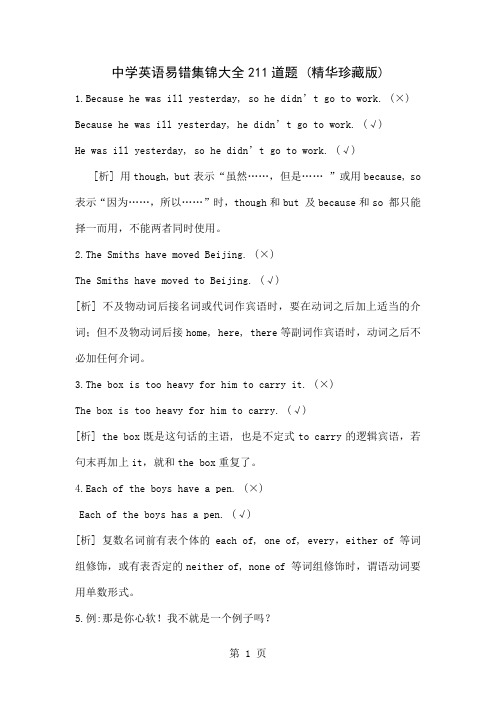
中学英语易错集锦大全211道题 (精华珍藏版)1.Because he was ill yesterday, so he didn’t go to work. (×) Because he was ill yesterday, he didn’t go to work. (√)He was ill yesterday, so he didn’t go to work. (√)[析] 用though, but表示“虽然……,但是……”或用because, so 表示“因为……,所以……”时,though和but 及because和so 都只能择一而用,不能两者同时使用。
2.The Smiths have moved Beijing. (×)The Smiths have moved to Beijing. (√)[析] 不及物动词后接名词或代词作宾语时,要在动词之后加上适当的介词;但不及物动词后接home, here, there等副词作宾语时,动词之后不必加任何介词。
3.The box is too heavy for him to carry it. (×)The box is too heavy for him to carry. (√)[析] the box既是这句话的主语, 也是不定式to carry的逻辑宾语,若句末再加上it,就和the box重复了。
4.Each of the boys have a pen. (×)Each of the boys has a pen. (√)[析] 复数名词前有表个体的each of, one of, every,either of等词组修饰,或有表否定的neither of, none of 等词组修饰时,谓语动词要用单数形式。
5.例:那是你心软!我不就是一个例子吗?Neither he nor you is good at English. (×)Neither he nor you are good at English. (√)[析] either... or..., neither... nor..., not only..., but also... 等词组连接句子的两个主语时,谓语动词遵循“就近一致原则”, 即由靠近谓语的那个主语决定谓语的人称和数用何种形式。
中考英语 易错集锦大全211道题

中学英语易错集锦大全211道题 (精华珍藏版)1.Because he was ill yesterday, so he didn’t go to work. (×)Because he was ill yesterday, he didn’t go to work. (√)He was ill yesterday, so he didn’t go to work. (√)[析] 用though, but表示“虽然……,但是……”或用because, so 表示“因为……,所以……”时,though和but 及because和so 都只能择一而用,不能两者同时使用。
2.The Smiths have moved Beijing. (×)The Smiths have moved to Beijing. (√)[析] 不及物动词后接名词或代词作宾语时,要在动词之后加上适当的介词;但不及物动词后接home, here, there等副词作宾语时,动词之后不必加任何介词。
3.The box is too heavy for him to carry it. (×)The box is too heavy for him to carry. (√)[析] the box既是这句话的主语, 也是不定式to carry的逻辑宾语,若句末再加上it,就和the box重复了。
4.Each of the boys have a pen. (×)Each of the boys has a pen. (√)[析] 复数名词前有表个体的each of, one of, every,either of等词组修饰,或有表否定的neither of, none of 等词组修饰时,谓语动词要用单数形式。
5.例:那是你心软!我不就是一个例子吗?Neither he nor you is good at English. (×)Neither he nor you are good at English. (√)[析] either... or..., neither... nor..., not only..., but also... 等词组连接句子的两个主语时,谓语动词遵循“就近一致原则”, 即由靠近谓语的那个主语决定谓语的人称和数用何种形式。
中考英语 易错集锦大全211道题
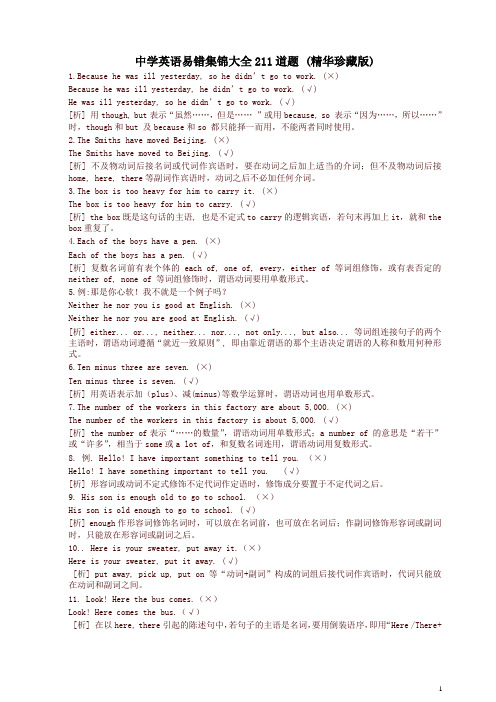
中学英语易错集锦大全211道题 (精华珍藏版)1.Because he was ill yesterday, so he didn’t go to work. (×)Because he was ill yesterday, he didn’t go to work. (√)He was ill yesterday, so he didn’t go to work. (√)[析] 用though, but表示“虽然……,但是……”或用because, so 表示“因为……,所以……”时,though和but 及because和so 都只能择一而用,不能两者同时使用。
2.The Smiths have moved Beijing. (×)The Smiths have moved to Beijing. (√)[析] 不及物动词后接名词或代词作宾语时,要在动词之后加上适当的介词;但不及物动词后接home, here, there等副词作宾语时,动词之后不必加任何介词。
3.The box is too heavy for him to carry it. (×)The box is too heavy for him to carry. (√)[析] the box既是这句话的主语, 也是不定式to carry的逻辑宾语,若句末再加上it,就和the box重复了。
4.Each of the boys have a pen. (×)Each of the boys has a pen. (√)[析] 复数名词前有表个体的each of, one of, every,either of等词组修饰,或有表否定的neither of, none of 等词组修饰时,谓语动词要用单数形式。
5.例:那是你心软!我不就是一个例子吗?Neither he nor you is good at English. (×)Neither he nor you are good at English. (√)[析] either... or..., neither... nor..., not only..., but also... 等词组连接句子的两个主语时,谓语动词遵循“就近一致原则”, 即由靠近谓语的那个主语决定谓语的人称和数用何种形式。
中学英语易错题集锦
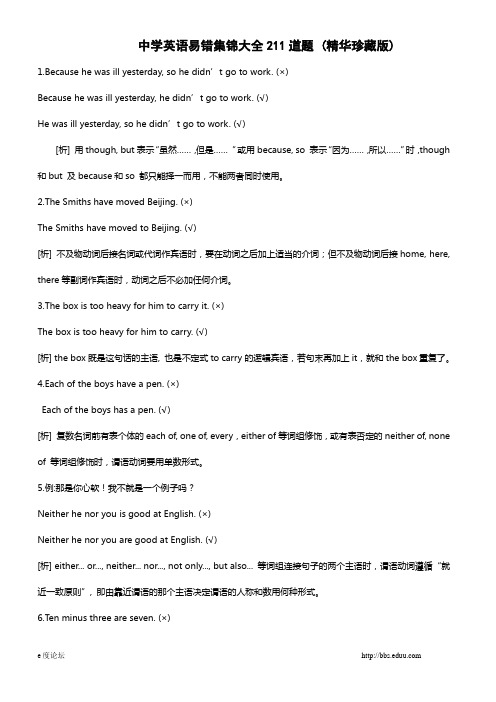
中学英语易错集锦大全211道题 (精华珍藏版)1.Because he was ill yesterday, so he didn’t go to work. (×)Because he was ill yesterday, he didn’t go to work. (√)He was ill yesterday, so he didn’t go to work. (√)[析] 用though, but表示“虽然……,但是……”或用because, so 表示“因为……,所以……”时,though 和but 及because和so 都只能择一而用,不能两者同时使用。
2.The Smiths have moved Beijing. (×)The Smiths have moved to Beijing. (√)[析] 不及物动词后接名词或代词作宾语时,要在动词之后加上适当的介词;但不及物动词后接home, here, there等副词作宾语时,动词之后不必加任何介词。
3.The box is too heavy for him to carry it. (×)The box is too heavy for him to carry. (√)[析] the box既是这句话的主语, 也是不定式to carry的逻辑宾语,若句末再加上it,就和the box重复了。
4.Each of the boys have a pen. (×)Each of the boys has a pen. (√)[析] 复数名词前有表个体的each of, one of, every,either of等词组修饰,或有表否定的neither of, none of 等词组修饰时,谓语动词要用单数形式。
5.例:那是你心软!我不就是一个例子吗?Neither he nor you is good at English. (×)Neither he nor you are good at English. (√)[析] either... or..., neither... nor..., not only..., but also... 等词组连接句子的两个主语时,谓语动词遵循“就近一致原则”, 即由靠近谓语的那个主语决定谓语的人称和数用何种形式。
中学英语易错集锦大全211道题 (精华珍藏版)

中学英语易错集锦大全211道题 (精华珍藏版)1.Because he was ill yesterday, so he didn’t go to work. (×)Because he was ill yesterday, he didn’t go to work. (√)He was ill yesterday, so he didn’t go to work. (√)[析] 用though, but表示“虽然……,但是……”或用because, so 表示“因为……,所以……”时,though和but 及because和so 都只能择一而用,不能两者同时使用。
2.The Smiths have moved Beijing. (×)The Smiths have moved to Beijing. (√)[析] 不及物动词后接名词或代词作宾语时,要在动词之后加上适当的介词;但不及物动词后接home, here, there等副词作宾语时,动词之后不必加任何介词。
3.The box is too heavy for him to carry it. (×)The box is too heavy for him to carry. (√)[析] the box既是这句话的主语, 也是不定式to carry的逻辑宾语,若句末再加上it,就和the box重复了。
4.Each of the boys have a pen. (×)Each of the boys has a pen. (√)[析] 复数名词前有表个体的each of, one of, every,either of等词组修饰,或有表否定的neither of, none of 等词组修饰时,谓语动词要用单数形式。
5.例:那是你心软!我不就是一个例子吗?Neither he nor you is good at English. (×)Neither he nor you are good at English. (√)[析] either... or..., neither... nor..., not only..., but also... 等词组连接句子的两个主语时,谓语动词遵循“就近一致原则”, 即由靠近谓语的那个主语决定谓语的人称和数用何种形式。
中考英语 易错集锦大全211道题

中学英语易错集锦大全211道题 (精华珍藏版)1.Because he was ill yesterday, so he didn’t go to work. (×)Because he was ill yesterday, he didn’t go to work. (√)He was ill yesterday, so he didn’t go to work. (√)[析] 用though, but表示“虽然……,但是……”或用because, so 表示“因为……,所以……”时,though和but 及because和so 都只能择一而用,不能两者同时使用。
2.The Smiths have moved Beijing. (×)The Smiths have moved to Beijing. (√)[析] 不及物动词后接名词或代词作宾语时,要在动词之后加上适当的介词;但不及物动词后接home, here, there等副词作宾语时,动词之后不必加任何介词。
3.The box is too heavy for him to carry it. (×)The box is too heavy for him to carry. (√)[析] the box既是这句话的主语, 也是不定式to carry的逻辑宾语,若句末再加上it,就和the box重复了。
4.Each of the boys have a pen. (×)Each of the boys has a pen. (√)[析] 复数名词前有表个体的each of, one of, every,either of等词组修饰,或有表否定的neither of, none of 等词组修饰时,谓语动词要用单数形式。
5.例:那是你心软!我不就是一个例子吗?Neither he nor you is good at English. (×)Neither he nor you are good at English. (√)[析] either... or..., neither... nor..., not only..., but also... 等词组连接句子的两个主语时,谓语动词遵循“就近一致原则”, 即由靠近谓语的那个主语决定谓语的人称和数用何种形式。
中学英语易错题集锦大全211道题(精华珍藏版)
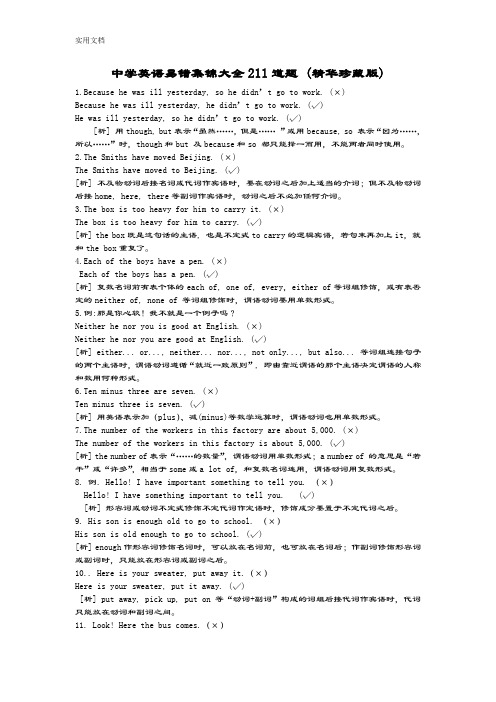
中学英语易错集锦大全211道题 (精华珍藏版)1.Because he was ill yesterday, so he didn’t go to work. (×)Because he was ill yesterday, he didn’t go to work. (√)He was ill yesterday, so he didn’t go to work. (√)[析] 用though, but表示“虽然……,但是……”或用because, so 表示“因为……,所以……”时,though和but 及because和so 都只能择一而用,不能两者同时使用。
2.The Smiths have moved Beijing. (×)The Smiths have moved to Beijing. (√)[析] 不及物动词后接名词或代词作宾语时,要在动词之后加上适当的介词;但不及物动词后接home, here, there等副词作宾语时,动词之后不必加任何介词。
3.The box is too heavy for him to carry it. (×)The box is too heavy for him to carry. (√)[析] the box既是这句话的主语, 也是不定式to carry的逻辑宾语,若句末再加上it,就和the box重复了。
4.Each of the boys have a pen. (×)Each of the boys has a pen. (√)[析] 复数名词前有表个体的each of, one of, every,either of等词组修饰,或有表否定的neither of, none of 等词组修饰时,谓语动词要用单数形式。
5.例:那是你心软!我不就是一个例子吗?Neither he nor you is good at English. (×)Neither he nor you are good at English. (√)[析] either... or..., neither... nor..., not only..., but also... 等词组连接句子的两个主语时,谓语动词遵循“就近一致原则”, 即由靠近谓语的那个主语决定谓语的人称和数用何种形式。
中学英语易错题集锦大全211道题(精华珍藏版)
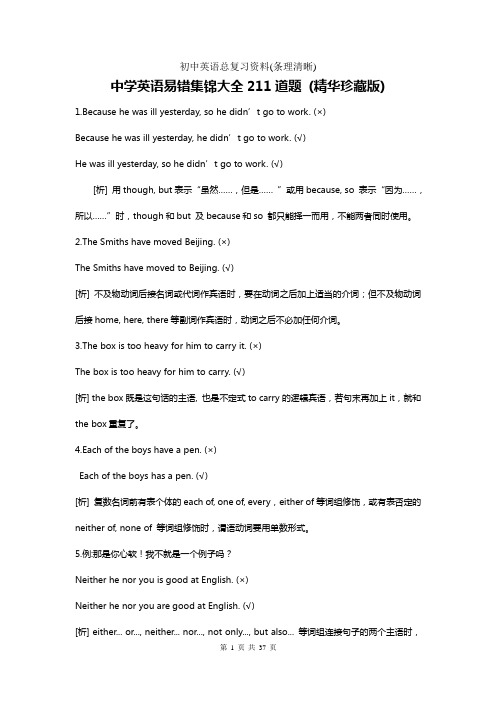
初中英语总复习资料(条理清晰)中学英语易错集锦大全211道题(精华珍藏版)1.Because he was ill yesterday, so he didn’t go to work. (×)Because he was ill yesterday, he didn’t go to work. (√)He was ill yesterday, so he didn’t go to work. (√)[析] 用though, but表示“虽然……,但是……”或用because, so 表示“因为……,所以……”时,though和but 及because和so 都只能择一而用,不能两者同时使用。
2.The Smiths have moved Beijing. (×)The Smiths have moved to Beijing. (√)[析] 不及物动词后接名词或代词作宾语时,要在动词之后加上适当的介词;但不及物动词后接home, here, there等副词作宾语时,动词之后不必加任何介词。
3.The box is too heavy for him to carry it. (×)The box is too heavy for him to carry. (√)[析] the box既是这句话的主语, 也是不定式to carry的逻辑宾语,若句末再加上it,就和the box重复了。
4.Each of the boys have a pen. (×)Each of the boys has a pen. (√)[析] 复数名词前有表个体的each of, one of, every,either of等词组修饰,或有表否定的neither of, none of 等词组修饰时,谓语动词要用单数形式。
5.例:那是你心软!我不就是一个例子吗?Neither he nor you is good at English. (×)Neither he nor you are good at English. (√)[析] either... or..., neither... nor..., not only..., but also... 等词组连接句子的两个主语时,谓语动词遵循“就近一致原则”, 即由靠近谓语的那个主语决定谓语的人称和数用何种形式。
中学英语易错题集锦大全211道题(精华珍藏版)
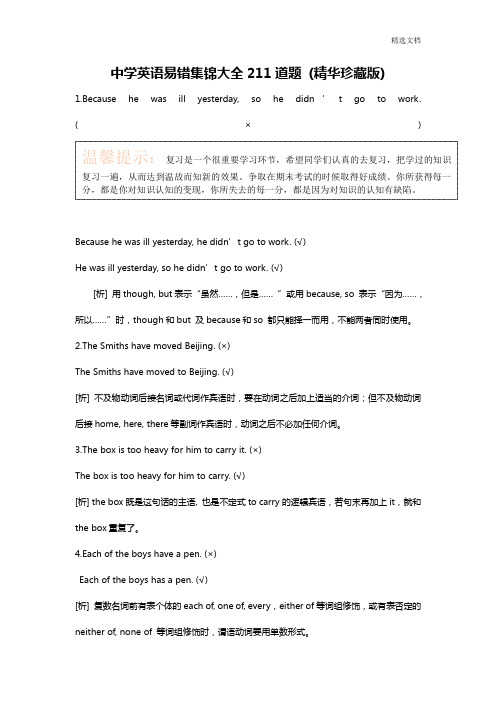
中学英语易错集锦大全211道题(精华珍藏版)1.Because he was ill yesterday, so he didn’t go to work. (×)Because he was ill yesterday, he didn’t go to work. (√)He was ill yesterday, so he didn’t go to work. (√)[析] 用though, but表示“虽然……,但是……”或用because, so 表示“因为……,所以……”时,though和but 及because和so 都只能择一而用,不能两者同时使用。
2.The Smiths have moved Beijing. (×)The Smiths have moved to Beijing. (√)[析] 不及物动词后接名词或代词作宾语时,要在动词之后加上适当的介词;但不及物动词后接home, here, there等副词作宾语时,动词之后不必加任何介词。
3.The box is too heavy for him to carry it. (×)The box is too heavy for him to carry. (√)[析] the box既是这句话的主语, 也是不定式to carry的逻辑宾语,若句末再加上it,就和the box重复了。
4.Each of the boys have a pen. (×)Each of the boys has a pen. (√)[析] 复数名词前有表个体的each of, one of, every,either of等词组修饰,或有表否定的neither of, none of 等词组修饰时,谓语动词要用单数形式。
5.例:那是你心软!我不就是一个例子吗?Neither he nor you is good at English. (×)Neither he nor you are good at English. (√)[析] either... or..., neither... nor..., not only..., but also... 等词组连接句子的两个主语时,谓语动词遵循“就近一致原则”, 即由靠近谓语的那个主语决定谓语的人称和数用何种形式。
中学英语易错题集锦大全211道题(精华珍藏版)

中学英语易错集锦大全211道题(精华珍藏版)欧阳家百(2021.03.07)1.Because he was ill yesterday, so he didn’t go to work. (×) Because he was ill yesterday, he didn’t go to work. (√)He was ill yesterday, so he didn’t go to work. (√)[析] 用though, but表示“虽然……,但是……”或用because, so 表示“因为……,所以……”时,though和but 及because和so 都只能择一而用,不能两者同时使用。
2.The Smiths have moved Beijing. (×)The Smiths have moved to Beijing. (√)[析] 不及物动词后接名词或代词作宾语时,要在动词之后加上适当的介词;但不及物动词后接home, here, there等副词作宾语时,动词之后不必加任何介词。
3.The box is too heavy for him to carry it. (×)The box is too heavy for him to carry. (√)[析] the box既是这句话的主语, 也是不定式to carry的逻辑宾语,若句末再加上it,就和the box重复了。
4.Each of the boys have a pen. (×)Each of the boys has a pen. (√)[析] 复数名词前有表个体的each of, one of, every,either of等词组修饰,或有表否定的neither of, none of 等词组修饰时,谓语动词要用单数形式。
5.例:那是你心软!我不就是一个例子吗?Neither he nor you is good at English. (×)Neither he nor you are good at English. (√)[析] either... or..., neither... nor..., not only..., but also... 等词组连接句子的两个主语时,谓语动词遵循“就近一致原则”, 即由靠近谓语的那个主语决定谓语的人称和数用何种形式。
中学英语易错题集锦大全211道题(精华珍藏版)
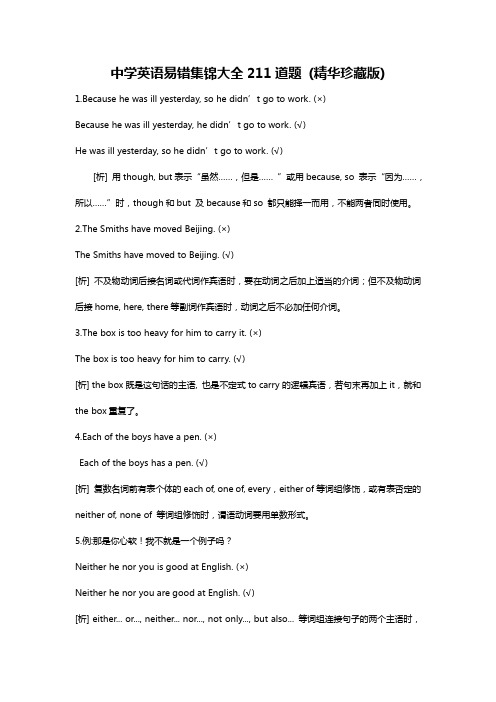
中学英语易错集锦大全211道题(精华珍藏版)1.Because he was ill yesterday, so he didn’t go to work. (×)Because he was ill yesterday, he didn’t go to work. (√)He was ill yesterday, so he didn’t go to work. (√)[析] 用though, but表示“虽然……,但是……”或用because, so 表示“因为……,所以……”时,though和but 及because和so 都只能择一而用,不能两者同时使用。
2.The Smiths have moved Beijing. (×)The Smiths have moved to Beijing. (√)[析] 不及物动词后接名词或代词作宾语时,要在动词之后加上适当的介词;但不及物动词后接home, here, there等副词作宾语时,动词之后不必加任何介词。
3.The box is too heavy for him to carry it. (×)The box is too heavy for him to carry. (√)[析] the box既是这句话的主语, 也是不定式to carry的逻辑宾语,若句末再加上it,就和the box重复了。
4.Each of the boys have a pen. (×)Each of the boys has a pen. (√)[析] 复数名词前有表个体的each of, one of, every,either of等词组修饰,或有表否定的neither of, none of 等词组修饰时,谓语动词要用单数形式。
5.例:那是你心软!我不就是一个例子吗?Neither he nor you is good at English. (×)Neither he nor you are good at English. (√)[析] either... or..., neither... nor..., not only..., but also... 等词组连接句子的两个主语时,谓语动词遵循“就近一致原则”, 即由靠近谓语的那个主语决定谓语的人称和数用何种形式。
中学英语易错题集锦大全211道题(精华珍藏版)

中学英语易错集锦大全211道题(精华珍藏版)1.Because he was ill yesterday, so he didn’t go to work. (×)Because he was ill yesterday, he didn’t go to work. (√)He was ill yesterday, so he didn’t go to work. (√)[析] 用though, but表示“虽然……,但是……”或用because, so 表示“因为……,所以……”时,though和but 及because和so 都只能择一而用,不能两者同时使用。
2.The Smiths have moved Beijing. (×)The Smiths have moved to Beijing. (√)[析] 不及物动词后接名词或代词作宾语时,要在动词之后加上适当的介词;但不及物动词后接home, here, there等副词作宾语时,动词之后不必加任何介词。
3.The box is too heavy for him to carry it. (×)The box is too heavy for him to carry. (√)[析] the box既是这句话的主语, 也是不定式to carry的逻辑宾语,若句末再加上it,就和the box重复了。
4.Each of the boys have a pen. (×)Each of the boys has a pen. (√)[析] 复数名词前有表个体的each of, one of, every,either of等词组修饰,或有表否定的neither of, none of 等词组修饰时,谓语动词要用单数形式。
5.例:那是你心软!我不就是一个例子吗?Neither he nor you is good at English. (×)Neither he nor you are good at English. (√)[析] either... or..., neither... nor..., not only..., but also... 等词组连接句子的两个主语时,谓语动词遵循“就近一致原则”, 即由靠近谓语的那个主语决定谓语的人称和数用何种形式。
最新中学英语易错集锦大全211道题 (精华珍藏版)
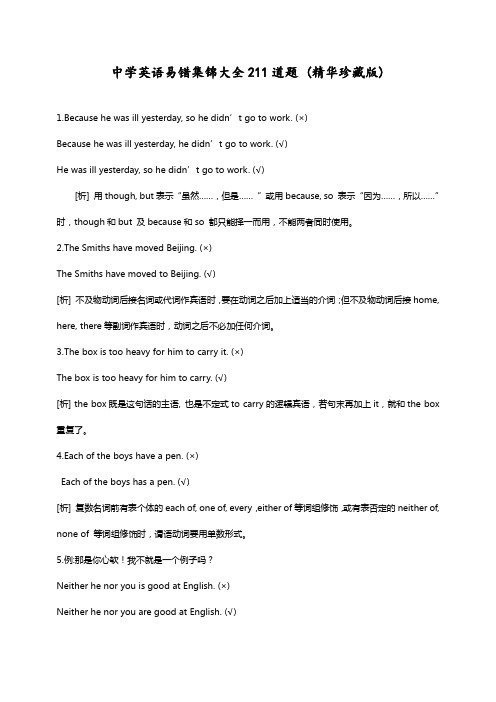
中学英语易错集锦大全211道题 (精华珍藏版)1.Because he was ill yesterday, so he didn’t go to work. (×)Because he was ill yesterday, he didn’t go to work. (√)He was ill yesterday, so he didn’t go to work. (√)[析] 用though, but表示“虽然……,但是……”或用because, so 表示“因为……,所以……”时,though和but 及because和so 都只能择一而用,不能两者同时使用。
2.The Smiths have moved Beijing. (×)The Smiths have moved to Beijing. (√)[析] 不及物动词后接名词或代词作宾语时,要在动词之后加上适当的介词;但不及物动词后接home, here, there等副词作宾语时,动词之后不必加任何介词。
3.The box is too heavy for him to carry it. (×)The box is too heavy for him to carry. (√)[析] the box既是这句话的主语, 也是不定式to carry的逻辑宾语,若句末再加上it,就和the box 重复了。
4.Each of the boys have a pen. (×)Each of the boys has a pen. (√)[析] 复数名词前有表个体的each of, one of, every,either of等词组修饰,或有表否定的neither of, none of 等词组修饰时,谓语动词要用单数形式。
5.例:那是你心软!我不就是一个例子吗?Neither he nor you is good at English. (×)Neither he nor you are good at English. (√)[析] either... or..., neither... nor..., not only..., but also... 等词组连接句子的两个主语时,谓语动词遵循“就近一致原则”, 即由靠近谓语的那个主语决定谓语的人称和数用何种形式。
中学英语易错集锦大全211道题 (精华珍藏版)
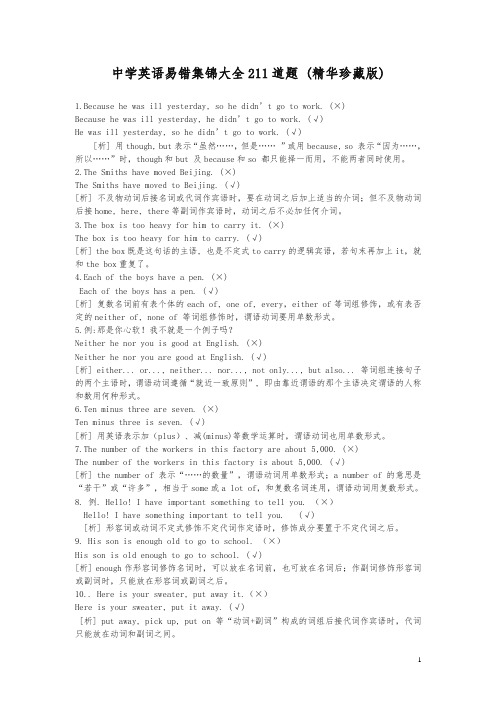
中学英语易错集锦大全211道题 (精华珍藏版)1.Because he was ill yesterday, so he didn’t go to work. (×)Because he was ill yesterday, he didn’t go to work. (√)He was ill yesterday, so he didn’t go to work. (√)[析] 用though, but表示“虽然……,但是……”或用because, so 表示“因为……,所以……”时,though和but 及because和so 都只能择一而用,不能两者同时使用。
2.The Smiths have moved Beijing. (×)The Smiths have moved to Beijing. (√)[析] 不及物动词后接名词或代词作宾语时,要在动词之后加上适当的介词;但不及物动词后接home, here, there等副词作宾语时,动词之后不必加任何介词。
3.The box is too heavy for him to carry it. (×)The box is too heavy for him to carry. (√)[析] the box既是这句话的主语, 也是不定式to carry的逻辑宾语,若句末再加上it,就和the box重复了。
4.Each of the boys have a pen. (×)Each of the boys has a pen. (√)[析] 复数名词前有表个体的each of, one of, every,either of等词组修饰,或有表否定的neither of, none of 等词组修饰时,谓语动词要用单数形式。
5.例:那是你心软!我不就是一个例子吗?Neither he nor you is good at English. (×)Neither he nor you are good at English. (√)[析] either... or..., neither... nor..., not only..., but also... 等词组连接句子的两个主语时,谓语动词遵循“就近一致原则”, 即由靠近谓语的那个主语决定谓语的人称和数用何种形式。
最新中学英语易错题集锦大全(精华珍藏版).doc
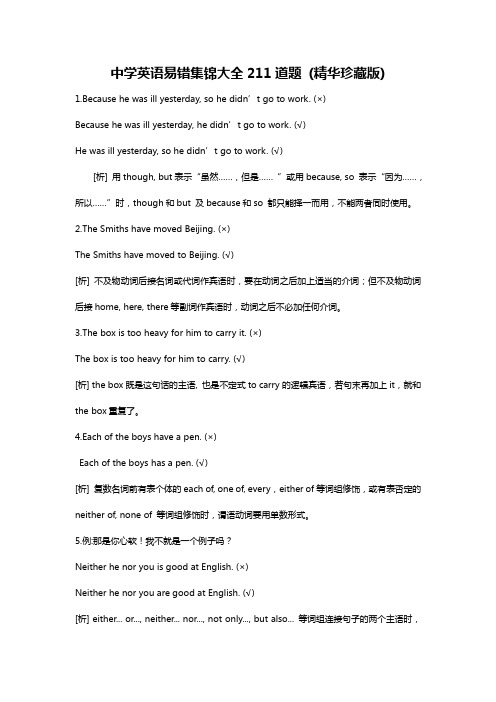
中学英语易错集锦大全211道题(精华珍藏版)1.Because he was ill yesterday, so he didn’t go to work. (×)Because he was ill yesterday, he didn’t go to work. (√)He was ill yesterday, so he didn’t go to work. (√)[析] 用though, but表示“虽然……,但是……”或用because, so 表示“因为……,所以……”时,though和but 及because和so 都只能择一而用,不能两者同时使用。
2.The Smiths have moved Beijing. (×)The Smiths have moved to Beijing. (√)[析] 不及物动词后接名词或代词作宾语时,要在动词之后加上适当的介词;但不及物动词后接home, here, there等副词作宾语时,动词之后不必加任何介词。
3.The box is too heavy for him to carry it. (×)The box is too heavy for him to carry. (√)[析] the box既是这句话的主语, 也是不定式to carry的逻辑宾语,若句末再加上it,就和the box重复了。
4.Each of the boys have a pen. (×)Each of the boys has a pen. (√)[析] 复数名词前有表个体的each of, one of, every,either of等词组修饰,或有表否定的neither of, none of 等词组修饰时,谓语动词要用单数形式。
5.例:那是你心软!我不就是一个例子吗?Neither he nor you is good at English. (×)Neither he nor you are good at English. (√)[析] either... or..., neither... nor..., not only..., but also... 等词组连接句子的两个主语时,谓语动词遵循“就近一致原则”, 即由靠近谓语的那个主语决定谓语的人称和数用何种形式。
中学英语易错集锦大全211道题 (精华珍藏版)
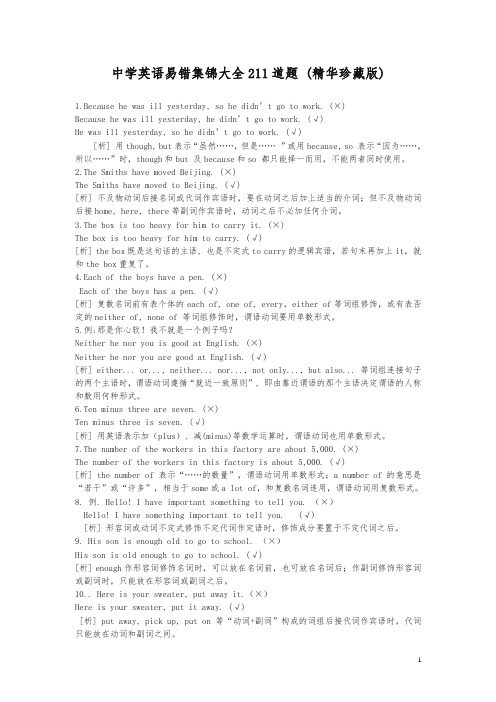
中学英语易错集锦大全211道题 (精华珍藏版)1.Because he was ill yesterday, so he didn’t go to work. (×)Because he was ill yesterday, he didn’t go to work. (√)He was ill yesterday, so he didn’t go to work. (√)[析] 用though, but表示“虽然……,但是……”或用because, so 表示“因为……,所以……”时,though和but 及because和so 都只能择一而用,不能两者同时使用。
2.The Smiths have moved Beijing. (×)The Smiths have moved to Beijing. (√)[析] 不及物动词后接名词或代词作宾语时,要在动词之后加上适当的介词;但不及物动词后接home, here, there等副词作宾语时,动词之后不必加任何介词。
3.The box is too heavy for him to carry it. (×)The box is too heavy for him to carry. (√)[析] the box既是这句话的主语, 也是不定式to carry的逻辑宾语,若句末再加上it,就和the box重复了。
4.Each of the boys have a pen. (×)Each of the boys has a pen. (√)[析] 复数名词前有表个体的each of, one of, every,either of等词组修饰,或有表否定的neither of, none of 等词组修饰时,谓语动词要用单数形式。
5.例:那是你心软!我不就是一个例子吗?Neither he nor you is good at English. (×)Neither he nor you are good at English. (√)[析] either... or..., neither... nor..., not only..., but also... 等词组连接句子的两个主语时,谓语动词遵循“就近一致原则”, 即由靠近谓语的那个主语决定谓语的人称和数用何种形式。
中学英语易错题集锦大全211道题(精华珍藏版)

中学英语易错集锦大全211道题(精华珍藏版)1.Because he was ill yesterday, so he didn’t go to work. (×)Because he was ill yesterday, he didn’t go to work. (√)He was ill yesterday, so he didn’t go to work. (√)[析] 用though, but表示“虽然……,但是……”或用because, so 表示“因为……,所以……”时,though和but 及because和so 都只能择一而用,不能两者同时使用。
2.The Smiths have moved Beijing. (×)The Smiths have moved to Beijing. (√)[析] 不及物动词后接名词或代词作宾语时,要在动词之后加上适当的介词;但不及物动词后接home, here, there等副词作宾语时,动词之后不必加任何介词。
3.The box is too heavy for him to carry it. (×)The box is too heavy for him to carry. (√)[析] the box既是这句话的主语, 也是不定式to carry的逻辑宾语,若句末再加上it,就和the box重复了。
4.Each of the boys have a pen. (×)Each of the boys has a pen. (√)[析] 复数名词前有表个体的each of, one of, every,either of等词组修饰,或有表否定的neither of, none of 等词组修饰时,谓语动词要用单数形式。
Neither he nor you is good at English. (×)Neither he nor you are good at English. (√)[析] either... or..., neither... nor..., not only..., but also... 等词组连接句子的两个主语时,谓语动词遵循“就近一致原则”, 即由靠近谓语的那个主语决定谓语的人称和数用何种形式。
中学英语易错集锦大全211道题 (精华珍藏版).doc
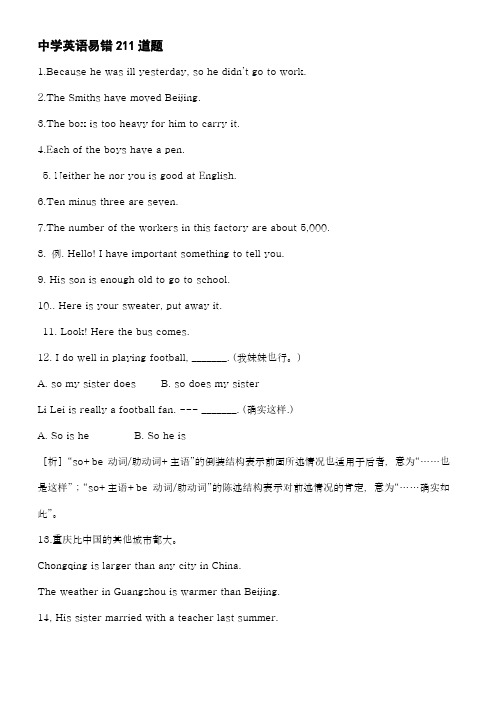
中学英语易错211道题1.Because he was ill yesterday, so he didn’t go to work.2.The Smiths have moved Beijing.3.The box is too heavy for him to carry it.4.Each of the boys have a pen.5. Neither he nor you is good at English.6.Ten minus three are seven.7.The number of the workers in this factory are about 5,000.8. 例. Hello! I have important something to tell you.9. His son is enough old to go to school.10.. Here is your sweater, put away it.11. Look! Here the bus comes.12. I do well in playing football, _______. (我妹妹也行。
)A. so my sister doesB. so does my sisterLi Lei is really a football fan. --- _______. (确实这样.)A. So is heB. So he is[析] “so+be动词/助动词+主语”的倒装结构表示前面所述情况也适用于后者,意为“……也是这样”;“so+主语+be动词/助动词”的陈述结构表示对前述情况的肯定,意为“……确实如此”。
13.重庆比中国的其他城市都大。
Chongqing is larger than any city in China.The weather in Guangzhou is warmer than Beijing.14, His sister married with a teacher last summer.15. There is going to have a film tonight.16. I’ll go hiking if it won’t rain next Sunday.17. Teacher told us yesterday that the earth went around the sun. (×)18. All the balls are not round. 翻译成汉语:19. He didn’t go to school yesterday, did he?-- _______, though he didn’t feel very well.A. No, he didn’tB. Yes, he did例--- Don’t you usually come to school by bike?-- _______. But I sometimes walk.A. No, I don’tB. Yes, I do20.---- Excuse me, is the supermarket far from here?---- No,it's about _______.A. 7 minutes walkB. 7 minute walkC. 7 minutes' walkD. 7 minute's walk21. You can not imagine how much I ______ on this dress. Is it beautiful?A. paidB. tookC. costD. spent22. ---- Do you know _____ university student who is talking with Joe?---- Yes,she,s my cousin, Kate.A. aB. anC. theD. /23. The number of giant pandas is getting ______ because their living areas are becoming farmlands.A. less and lessB. larger and largerC. smaller and smallerD. fewer and fewer24. Be careful when you come _______ the street,because the traffic is very busyat the moment.A. across B. behind C. between D. over25. ---- Do you often clean your classroom?---- Yes, our classroom ______ every day.A. cleanB. cleansC. is cleanedD. Cleaned26. Lucy usually cleans the cage every two days. (对画线部分提问)_ _______ Lucy usually clean the cage?27. I didn't understand __________,so I raised my hand to ask...A. what my teacher saysB. what does my teacher sayC. what my teacher saidD. what did my teacher say28. ---- How much ______ the shoes?---- Five dollars ______ enough.A. is;isB. are;isC. are;areD. is;are29. We got to the top of the mountain in daybreak.30. Dont sleep at daytime31. He became a writter at his twenties32. We went to swim in the river in a very hot day.33. Im looking forward to seeing you on Christmas.34. I havent see you during the summer holidays.35. At entering the classroom, I heard the good news.36. In the beginning of the book, there are some interesting stories.37. Till the end of next week. I will have finished this work.38. He came to London before last weekend.39. I have studied English for three years since I had come here.40. I can help you repair this bike. You will get it after two hours.41. Three days after he died.42. She hid herself after the tree.43. There is a beautiful bird on the tree.44. Shanghai is on the east of China.45. I arrived at New York on July 2nd.46. He lived in No. 3 Beijing Road. 〔47. There is a colour TV set at the corner of the hall. 〔48. Do you know there is some good news on todays newspaper?49. The school will begin on September 1st.50. Ill leave Beijing to Shanghai tomorrow.51. Im sorry. I have to get out the bus at next stop.52. Be careful The temperature of the water is ninety degrees over zero.53. The Dead Sea is under the sea level.54. There is a big tree in the front of the house.55. It took them two days to walk across the forest.56. The sun sets toward the west.57. Can I write the exam paper with ink?58. Im earlier today. I came here by his car.59. A lot of French wines are made of grape.60. This is a good dictionary in English grammar.61. Do you have the key of the door. 〔62. I didnt do my homework, so the teacher was angry to me.63. He was good for skating.64. It was good to you to help my little boy.65. My parents were very pleased at me.66. He is agree with me.67. I havent heard letters from him.。
- 1、下载文档前请自行甄别文档内容的完整性,平台不提供额外的编辑、内容补充、找答案等附加服务。
- 2、"仅部分预览"的文档,不可在线预览部分如存在完整性等问题,可反馈申请退款(可完整预览的文档不适用该条件!)。
- 3、如文档侵犯您的权益,请联系客服反馈,我们会尽快为您处理(人工客服工作时间:9:00-18:30)。
中学英语易错集锦大全211道题(精华珍藏版)1.Because he was ill yesterday, so he didn’t go to work. (×)Because he was ill yesterday, he didn’t go to work. (√)He was ill yesterday, so he didn’t go to work. (√)[析] 用though, but表示“虽然……,但是……”或用because, so 表示“因为……,所以……”时,though和but 及because和so 都只能择一而用,不能两者同时使用。
2.The Smiths have moved Beijing. (×)The Smiths have moved to Beijing. (√)[析] 不及物动词后接名词或代词作宾语时,要在动词之后加上适当的介词;但不及物动词后接home, here, there等副词作宾语时,动词之后不必加任何介词。
3.The box is too heavy for him to carry it. (×)The box is too heavy for him to carry. (√)[析] the box既是这句话的主语, 也是不定式to carry的逻辑宾语,若句末再加上it,就和the box重复了。
4.Each of the boys have a pen. (×)Each of the boys has a pen. (√)[析] 复数名词前有表个体的each of, one of, every,either of等词组修饰,或有表否定的neither of, none of 等词组修饰时,谓语动词要用单数形式。
5.例:那是你心软!我不就是一个例子吗?Neither he nor you is good at English. (×)Neither he nor you are good at English. (√)[析] either... or..., neither... nor..., not only..., but also... 等词组连接句子的两个主语时,谓语动词遵循“就近一致原则”, 即由靠近谓语的那个主语决定谓语的人称和数用何种形式。
6.T en minus three are seven. (×)Ten minus three is seven. (√)[析] 用英语表示加(plus)、减(minus)等数学运算时,谓语动词也用单数形式。
7.The number of the workers in this factory are about 5,000. (×)The number of the workers in this factory is about 5,000. (√)[析] the number of表示“……的数量”,谓语动词用单数形式;a number of 的意思是“若干”或“许多”,相当于some或a lot of,和复数名词连用,谓语动词用复数形式。
8. 例. Hello! I have important something to tell you. (×)Hello! I have something important to tell you. (√)[析] 形容词或动词不定式修饰不定代词作定语时,修饰成分要置于不定代词之后。
9. His son is enough old to go to school. (×)His son is old enough to go to school. (√)[析] enough作形容词修饰名词时,可以放在名词前,也可放在名词后;作副词修饰形容词或副词时,只能放在形容词或副词之后。
10.. Here is your sweater, put away it.(×)Here is your sweater, put it away. (√)[析] put away, pick up, put on等“动词+副词”构成的词组后接代词作宾语时,代词只能放在动词和副词之间。
11. Look! Here the bus comes.(×)Look! Here comes the bus.(√)[析] 在以here, there引起的陈述句中,若句子的主语是名词,要用倒装语序,即用“Here /There+动词+名词”结构;但主语若是代词时,则不用倒装语序, 即用“Here/There +代词+动词”结构。
12. I do well in playing football, _______. (我妹妹也行。
)A. so my sister does(×)B. so does my sister(√)Li Lei is really a football fan. --- _______. (确实这样.) A. So is he(×) B. So he is(√)[析] “so+be动词/助动词+主语”的倒装结构表示前面所述情况也适用于后者,意为“……也是这样”;“so+主语+be动词/助动词”的陈述结构表示对前述情况的肯定,意为“……确实如此”。
13.重庆比中国的其他城市都大。
Chongqing is larger than any city in China. (×)Chongqing is larger than any other city in China. (√)[析] “any city in China”包括了重庆这座城市, 同一事物自己与自己不能做比较,只有在city 前加上other才能表示重庆和中国的其它城市比较大小。
The weather in Guangzhou is warmer than Beijing. (×)The weather in Guangzhou is warmer than that in Beijing . (√)[析] 表示比较时,句子中的两个比较对象必须一致,不同的比较对象不能做比较。
错误句的比较对象分别为the weather in Guangzhou和Beijing,这两个不同类的事物之间不能做比较。
14, His sister married with a teacher last summer.(×)His sister married a teacher last summer. (√)[析] 表达“A和B结婚”,要用A married/will marry B。
这时务必要避免受汉语影响使用A married/will marry with B。
15. 例There is going to have a film tonight. (×) There is going to be a film tonight. (√)[析] 一般将来时用在There be 句式中时,be going to或will之后的动词原形只能用be,也就是说要用There is (are) going to be.... / There will be....。
16. 例I’ll go hiking if it won’t rain next Sunday. (×)I’ll go hiking if it doesn’t rain next Sunday.(√)[析] 习惯上在含有时间状语从句和条件状语从句的复合句中,如果主句的谓语动词用了一般将来时,从句的谓语动词要用一般现在时表示将来的动作。
17.例Teacher told us yesterday that the earth went around the sun. (×) Teacher told us yesterday that the earth goes around the sun. (√)[析] 习惯上在含有宾语从句的复合句中,主句的谓语动词用了一般过去时,从句的谓语动词要用过去的某种时态。
但如果从句表述的是一客观事实或客观真理时,则不受主句时态的影响,而用一般现在时。
18. All the balls are not round. 翻译成汉语:所有的球都不是圆的。
(×)并不是所有的球都是圆的。
(√)[析] all, every, both等词和not连用时,not通常放在all, every, both的后面,一般情况下表示部分否定,意为“并非……都……”。
19. 例--- He didn’t go to school yesterday, did he?-- _______, though he didn’t feel very well.A. No, he didn’t (×)B. Yes, he did (√)例--- Don’t you usually come to school by bike?-- _______. But I sometimes walk.A. No, I don’t (×)B. Yes, I do (√)[析] 习惯上英语中的yes意为“是的”,no意为“不”,但在“前否后肯”的反意疑问句或否定疑问句中,yes意为“不”,no意为“是的”。
20.---- Excuse me, is the supermarket far from here?---- No,it's about _______.A. 7 minutes walkB. 7 minute walkC. 7 minutes' walkD. 7 minute's walk答案为C。
本题考查名词所有格用法。
当名词的复数以-s结尾时,则只需要加“'”即可,则“7分钟的距离”为“7 minutes' walk”。
21. You can not imagine how much I ______ on this dress. Is it beautiful?A. paidB. tookC. costD. spent[剖析] 答案为D。
本题考察四个表“花费”的动词辨析。
主语为人,且和介词on搭配的动词是spend。
22. ---- Do you know _____ university student who is talking with Joe?---- Yes,she,s my cousin, Kate.A. aB. anC. theD. /[剖析] 答案为C。
